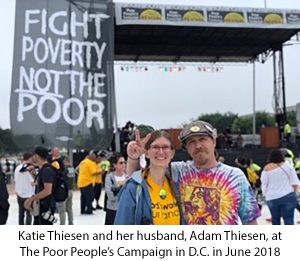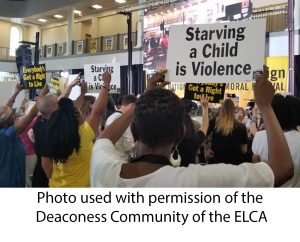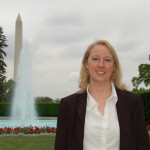By guest blogger Katie Thiesen, Deaconess Community of the ELCA candidate from the ELCA New England Synod
The Deaconess Community of the ELCA is using prophetic diakonia – or service that leads to social change that restores, reforms and transforms – to do the work of justice with the Poor Peoples Campaign (PPC). This movement encourages us to be grounded in the thousands of scripture verses that call God’s people to the work of justice.
We claim as Lutherans that we are loved. We also know that being personally loved is only part of the story. Being unconditionally and radically loved is not an end. We more fully realize that radical love when we see the sacredness and love for ALL.
“Every stranger I meet is a part of me I don’t yet know – and I a part of them. Together, strangers, inextricably connected, we live into God’s reign on earth.” – Sister Davia Evans
After hearing the scriptural call to radical love, I have struggled with what it means to do the work of charity. If I see you hungry and feed you one meal, knowing that you will again be hungry later, where does that leave my relationship with you and with God? Matthew 25 connects us to Jesus in the encounter – “when you saw me hungry.” One meal begs many questions, including: Did not God create this world in abundance for all?
 I am learning I must never stop with acts of charity. We all need to have daily needs met now, so we need charity now. Yet charity is only needed because we do not have justice and will only be needed until we have justice! Matthew 25:31-46 and James 2:15-22 call us out when we leave one another without needs met. Micah 6:8 calls us to justice.
I am learning I must never stop with acts of charity. We all need to have daily needs met now, so we need charity now. Yet charity is only needed because we do not have justice and will only be needed until we have justice! Matthew 25:31-46 and James 2:15-22 call us out when we leave one another without needs met. Micah 6:8 calls us to justice.
Hear in this two minute video names and reasons including Emmett Till to Sean Reed “and the too many murdered just because they were black” that compel this deaconess to participate in the PPC: “The Poor Peoples Campaign is a vision and a movement for right now. That’s why I am going.” – Sister Ramona Daily
At a small PPC gathering in 2018, organizers called us together in a circle, asking us to stand next to people we didn’t know. We were then asked to turn to our left and then turn to our right and say, “Hello Image of God!” Even typing this brings me to my knees two years later.
This immediately consecrated everyone in the room! No one was more the image of God than another, and no one less. I felt a surge of the Holy Spirit moving about that space, affirming we all belonged, we all were loved and able to love in return, and we all wanted to be part of each person’s complete wellbeing.
We are not all the same, as 1 Corinthians 12:26 shares, but in all of our beauty and diverse gifts, we are ONE. I do not have all the answers of how to do and be this moral fusion work, but it grounds me and crosses every line of division.
 The Deaconess Community of the ELCA endorsed the Poor People’s Campaign in 2019. “For over 130 years our Community has been acting on our call to prophetic diakonia – we can do this better with the Poor People’s Campaign, A National Call for Moral Revival fusion movement,” said Sister Noreen Stevens, Directing Deaconess, of work carried forward with the movement begun by the Rev. Dr. Martin Luther King, Jr. The Mass Poor People’s Assembly and Moral March on Washington on June 20, 2020 will be a digital gathering of poor, dispossessed and impacted people, faith leaders, and people of conscience, marshalling collective voices to demonstrate the power of our communities, and you can register from this link.
The Deaconess Community of the ELCA endorsed the Poor People’s Campaign in 2019. “For over 130 years our Community has been acting on our call to prophetic diakonia – we can do this better with the Poor People’s Campaign, A National Call for Moral Revival fusion movement,” said Sister Noreen Stevens, Directing Deaconess, of work carried forward with the movement begun by the Rev. Dr. Martin Luther King, Jr. The Mass Poor People’s Assembly and Moral March on Washington on June 20, 2020 will be a digital gathering of poor, dispossessed and impacted people, faith leaders, and people of conscience, marshalling collective voices to demonstrate the power of our communities, and you can register from this link.
“The PPC is a moral call to take care of all of God’s people in an equitable way. The prophets called out injustice, and Jesus stood with the most vulnerable. It is our mandate to follow the command to Love your neighbor. This campaign addresses the root causes of injustice, and we are called through our baptisms to serve all people, following the example of Jesus, and to strive for justice and peace in all the earth.” – Sister Dottie Almoney, Chair, Board of Directors of the Deaconess Community
You already have a place of belonging in this movement as we are all doing the work of being the one body we were created to be.






